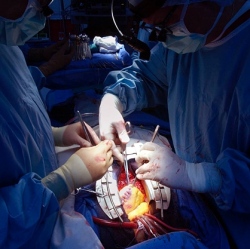
Previous research has suggested that Salmonella needn’t always bring bad news and stomach cramps. Certain strains have been shown to kill off cancer cells, but to use them as a form of treatment for humans without inducing any nasty side effects has so far proven difficult.
Now, researchers have developed genetically modified salmonella that turns toxic only after it enters a tumor. A team of researchers from Germany’s Helmholtz Center for Infection Research and Arizona State University worked with a strain known as Salmonella enterica Serovar Typhimurium. This strain has been demonstrated to colonize tumors and attack the cancer cells.
It was the group’s thinking that altering part of the bacteria’s outer membrane called the lipopolysaccharide structure (LPS) could serve to improve its safety. This is because LPS is one of the primary causes for sepsis, a condition that sees inflammation spread throughout the body that can lead to organ failure and death.
Through genetic engineering, the scientists were able to remove genes integral to the synthesis of the LPS. They then tested variants of the newly modified Salmonella strains both in the lab with human cancer cells and in mice with tumors. They discovered that one in particular was effective at destroying cancer cells and shrinking the tumors when injected into the mice, without the typical negative impacts on the surrounding healthy cells.
This ability to transform from a harmless bacteria to a ruthless destroyer of all things cancerous when it arrives at the tumor is attributed to how Salmonella develops in different environments. In regular cells, Salmonella will divide only once or twice each day, while inside a tumor it divides hourly.
